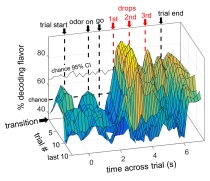The neurotransmitter dopamine helps people remember the pleasurable effects of drugs and reinforces the desire to seek them out again, making it centrally involved in addiction. Relatedly, dopamine neurons are also involved in “prediction errors,” responding when the value of a reward is more or less than expected. Scientists from NIDA’s Intramural Research Program demonstrated that dopamine neurons in the midbrain also respond to errors predicting features of a reward that are unrelated to its value, and a new study extends these findings. This research suggests that dopamine neurons are carrying much more information than previously thought, opening up new possibilities for how the dopamine system might be contributing to learning.
Researchers recorded the activity of midbrain dopamine neurons in rats trained on a task in which particular odors signaled the availability of a reward—drops of a flavored sugary drink—in one of two fluid wells. In subsequent trials, the scientists mixed things up---rewards were omitted, delivered unexpectedly, or flavors were changed. Even so, the rats continued to respond correctly, indicating they had learned how each odor predicted the location of the reward. They also discovered that, in addition to responding to changes in the availability of the reward (i.e., their omission or unexpected delivery), an assembly of dopamine neurons signaled the flavor of the reward when it had changed, even though the animals did not appear to value one flavor over another. This finding means that dopamine neurons could be telling other parts of the brain what needs to be learned when rewards change unexpectedly. Investigators went on to do comparable testing with 23 human subjects in a paradigm where visual cues predicted rewarding food odors while examining brain activity via fMRI. They found, just as in the rats, that it was possible to decode the identity of the unexpected odor based on the pattern of activity observed in the brain region where dopamine neurons are found.
These experiments suggest that groups of dopamine neurons in both rats and humans signal information about the specific sensory features of unexpected rewards. These results provide evidence that ensembles of dopamine neurons provide highly specific teaching signals, opening new possibilities for how this system might contribute to learning, and potentially, how changes in dopamine signaling may contribute to addiction.
The team of scientists hails from NIDA’s Intramural Research Program and Northwestern University.
Study:
- Thomas A. Stalnaker; James D. Howard; Yuji K. Takahashi; Samuel J. Gershman; Thorsten Kahnt; Geoffrey Schoenbaum. Dopamine neuron ensembles signal the content of sensory prediction errors. Neuroscience.

